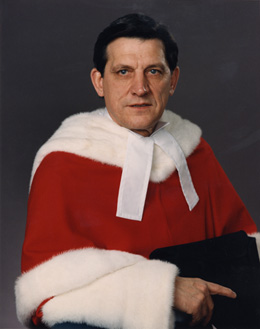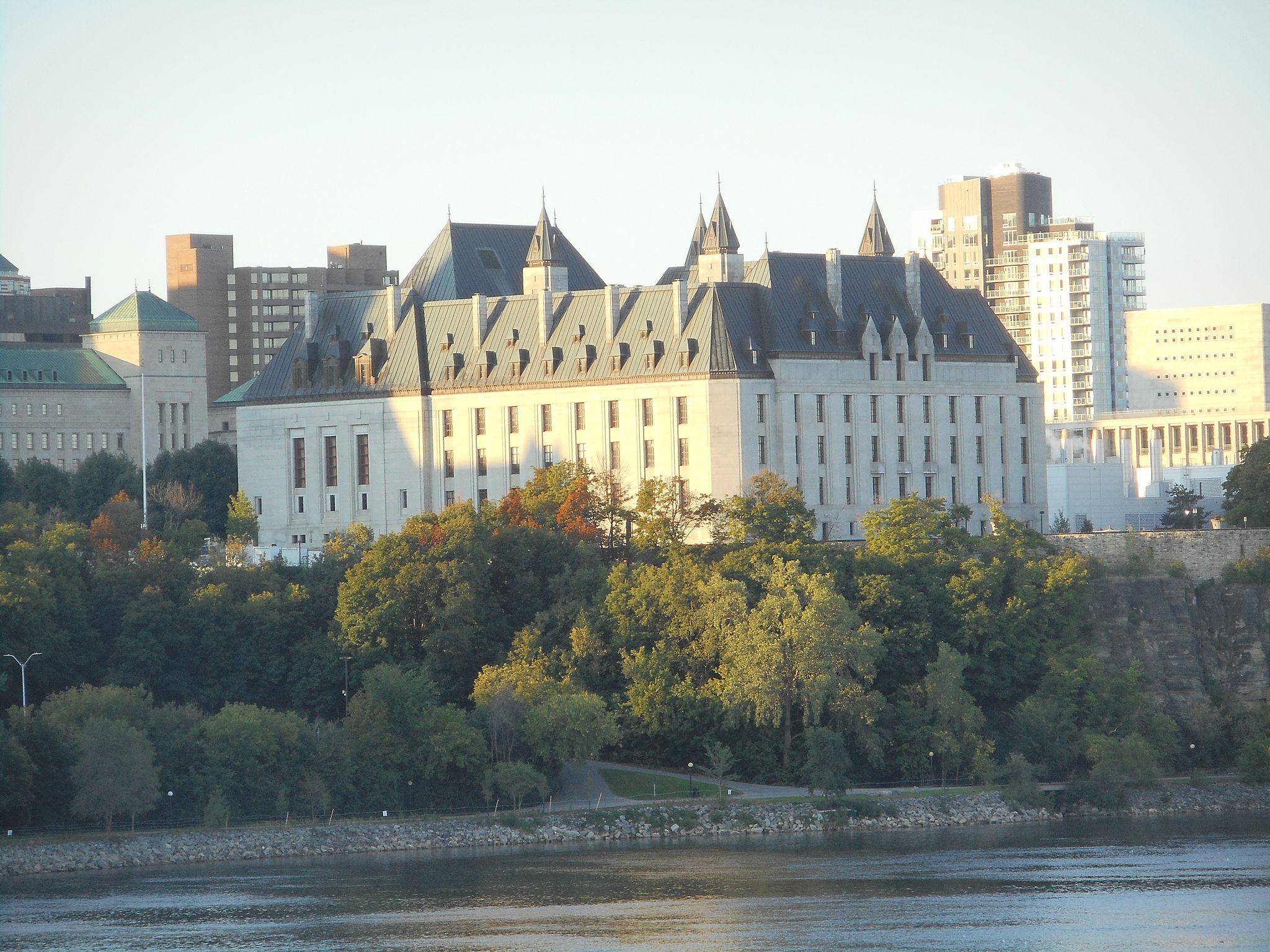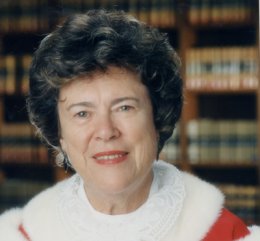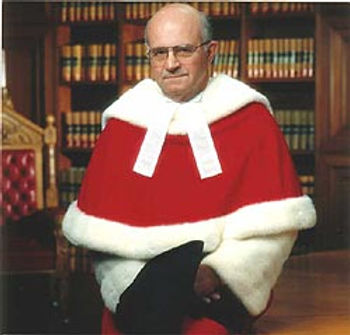Gérard Vincent Joseph La Forest, CC, FRSC, KC, justice of the Supreme Court of Canada 1985–97, justice of the Court of Appeal of New Brunswick 1981–85, civil servant, university professor, lawyer, author, (born 1 April 1926 in Grand Falls, NB; died 12 June 2025 in Fredericton, NB). Gérard La Forest was a legal scholar who taught at five universities. He served as assistant deputy attorney general and with the Law Reform Commission of Canada and the Canadian Bar Association. He was also a justice with the Court of Appeal of New Brunswick and the Supreme Court of Canada. La Forest was influential in recommending such legal changes as patriating the Constitution, creating a new charter of rights, and re-evaluating federal-provincial power sharing. He also made a significant contribution in cases related to the environment. He received numerous honorary degrees and was a Companion of the Order of Canada.

Early Life and Education
Gérard La Forest was born and raised in Grand Falls, a small town in western New Brunswick. He began his undergraduate studies at St. Francis Xavier University. In 1949, he received a Bachelor of Civil Law from the University of New Brunswick. He then attended Oxford University a Rhodes Scholarship. He earned a BA there in 1951 and an MA in 1956. At Yale University, he earned a Master of Laws in 1965 and a Doctor of the Science of Law (JSD) in 1966.
While completing his education, La Forest had his own law firm in Grand Falls and was a legal adviser for Irving Oil. From 1952 to 1955, he served with the federal Department of Justice.
Academic and Public Service Career
In 1956, Gérard La Forest joined the University of New Brunswick as an associate professor. He was later promoted to professor. He was also a visiting professor of law at the Université de Montréal from 1962 to 1963. From 1968 to 1970, he was dean of the Faculty of Law at the University of Alberta. He was then a lecturer at McGill University’s law department n 1971 and again in 1979.
La Forest served on the Royal Commission on Government Organization. Its 1963 report recommended less centralized control of government departments. He also served on the Royal Commission on Pilotage. In 1968, it made recommendations to improve the efficiency and safety of shipping in Canadian waterways.
From 1970 to 1974, La Forest was assistant deputy attorney general of Canada. He then left the Department of Justice to work with the Law Reform Commission of Canada from 1974 to 1979. The commission works at arm’s length from the federal government, offering advice as to how laws can be improved. La Forest played a role in commissioning reports that led to many changes that were later adopted, including those involving divorce and spousal and child support. (See also Family Law in Canada.) While living in Ottawa, La Forest also taught law at the University of Ottawa.
With the 1976 election of the separatist Parti Québécois government in Quebec, the Canadian Bar Association appointed La Forest as executive vice-chairman of a committee to examine the flexibility of the Constitution and to recommend changes. Some of its key recommendations — such as patriating the Constitution, creating a new bill of rights, and re-evaluating federal-provincial power sharing — were eventually implemented.
Throughout his career, La Forest wrote numerous reports, beginning with Disallowance and Reservation of Provincial Legislation (1955). He wrote six books addressing legal issues, such as Natural Resources and Public Property Under the Canadian Constitution (1969). La Forest was also a prolific writer of articles, papers and presentations. His first was “Bonne Entente,” published in the University of New Brunswick Law Journal in 1947. La Forest also contributed insightful book reviews to journals across Canada.
New Brunswick Court of Appeal
In 1981, Gérard La Forest was appointed to the Court of Appeal of New Brunswick. Over his four years on the bench, La Forest rendered decisions on a range of cases that included contracts, family law and criminal law, among others.

Supreme Court of Canada
On 16 January 1985, Prime Minister Brian Mulroney appointed La Forest to the Supreme Court of Canada. He served for 12 years before retiring on 30 September 1997. It was a busy time for the Court. Governments and the justice system were still adjusting to the 1982 passage of the Charter of Rights and Freedoms. It transformed the judicial approach to various laws.
The most significant contribution La Forest made to the Court was with cases related to the environment. In R. v. Crown Zellerbach Canada Ltd., La Forest wrote a dissent arguing that the Parliament of Canada could pass laws to combat water pollution. In Friends of the Oldman River Society v. Canada, he wrote the majority opinion that the federal government must conduct environmental assessments before regulating or funding provincial projects. In R. v. Hydro-Québec, La Forest wrote the majority argument. It stated that the Canadian Environmental Protection Act gave the federal government the power to regulate the manufacturing, importation, sale, use and disposal of toxic materials. (See also Environmental Law.)
Career after the Supreme Court
After retiring from the Supreme Court in 1997, Gérard La Forest served for a year as a director of the Canada Pension Plan. It operates independently of the federal and provincial governments to ensure sound investments and stable management.
in April 1999, La Forest was appointed chair of the Canadian Human Rights Act Review Panel. It was responsible for writing Promoting Equality: A New Vision. The report made 165 recommendations to better render laws and legal processes to protect human rights and equality.
In his later years, La Forest served as counsel at the law firm of Stewart McKelvey. He specialized in cases concerning environmental and natural resources litigation and dispute resolution. He died in June 2025 at the age of 99.
Honours
The law library at the University of New Brunswick Faculty of Law was named the Gérard V. La Forest Law Library in 1992. A rare books room within the library was also named in his honour in 2012.
Awards
- Fellow, Royal Society of Canada (1975)
- Companion, Order of Canada (2000)
- Queen Elizabeth II Diamond Jubilee Medal (2012)
Honorary Degrees
- Doctor of Laws, University of Basel (1981)
- Doctor of Civil Law, University of New Brunswick (1985)
- Honorary Degree, University of Ottawa (1985)
- Doctor of Laws, Francis Xavier University (1988)
- Doctor of Laws, Thomas University (1988)
- Doctor of Laws, University of Alberta (1988)
- Doctor of Laws, Université de Moncton (1988)
- Doctor of Laws, Bates College (1990)
- Doctor of Civil Law, University of Windsor (1998)

 Share on Facebook
Share on Facebook Share on X
Share on X Share by Email
Share by Email Share on Google Classroom
Share on Google Classroom






